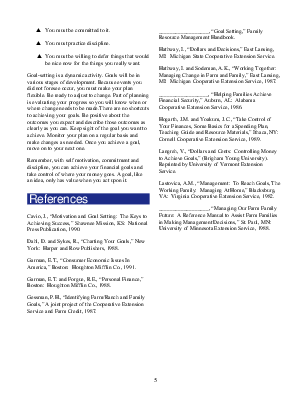







achieve a goal not related to the values you hold, you will probably feel unrewarded and dissatisfied. |
|
|
▲ |
Goals need to be specific. The goal, I want lots of money in the bank, has little meaning. Is “lots of money” $5,000 or $50,000? When will you know you have “lots of money”? Write each goal in specific terms. Write the goal in terms you can measure. |
|
L |
ist some things you want that will require financial resources. If you are setting financial goals for the family, each family member should write a list of wants requiring financial resources.

|
G |
oals focus on what, what you need or what you want. Some goals you have listed can be achieved in two years or less. These goals are referred to as short-term goals.
From the list(s) you prepared, list the short-term goals. Be sure to combine the short-term goals of all family members.

2
|
L |
ong-term goals relate to what you want to accomplish in five or more years. Long-term goals usually require more resources for achievement. From your list(s) of wants, write down your long-term goals. Include the long-term goals of all family members.

|
T |
ypically there will be more goals than there are resources available for reaching them. You must now prioritize the goals you have. Most financial planners agree that it is almost impossible to work toward
more than two or three goals at once. If you have already identified what you think is important, reaching the goals in order of importance will be fairly easy to do.
Identify the goals in the order you want to reach them. To identify possible conflict, each family member should develop a list of short-term and long-term goals to work toward.

|
W |
hen the individual lists are completed, hold a family discussion to resolve potential conflicts. As a family unit, decide on which individual and family goals are important enough to use family resources to achieve.
You may find there is conflict among goals. This will be especially true if you are working on goals for the family, when each family member has a variety of goals. Open, honest discussions among family members can reduce conflict over the use of resources to reach family and individual goals. Goal setting and allocating resources to meet goals will require compromise among family members. Family members will need to treat each other’s goals with respect. Really listen to what others say about their goals and allow each person to state opinions, needs and feelings without fear of criticism.
Another area of conflict may exist between short-term and long-term goals. Short-term goals often serve as bridges for moving you from where you are to where you want to be. However, if too many short-term goals are not related to the achievement of long-term goals, progress toward reaching long-term goals may be slowed or even stopped. To achieve long-term goals, you may find it necessary to give up something you would like to have now. This may require the dropping of some short-term goals.
|
T |
o help resolve conflicts that may arise, examine each goal by asking these questions:
▲ Is this a goal that must or ought to be reached?
▲ Does the goal contribute to what you want to do as an individual or a family?
▲ Will the goal help you to get what you really want?
▲ Is it a goal that could be delayed?
|
▲ |
Is the goal important to the wellbeing of the whole family? |
|
▲ |
Is the goal so important it should be reached even though it would prevent reaching other goals? |
|
▲ |
Will this short-term goal delay or defeat reaching long-term goals |
Уважаемый посетитель!
Чтобы распечатать файл, скачайте его (в формате Word).
Ссылка на скачивание - внизу страницы.